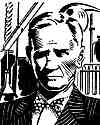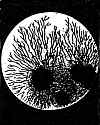|
A Radio Talk by Charles F. Kettering  Just recently, a news item told us that the noted scientist Dr.
Alexander Fleming, the discoverer of Penicillin, is in America for
a
visit with our doctors, scientists and manufacturers. The story of this
discovery is both interesting and instructive.
Just recently, a news item told us that the noted scientist Dr.
Alexander Fleming, the discoverer of Penicillin, is in America for
a
visit with our doctors, scientists and manufacturers. The story of this
discovery is both interesting and instructive.One day seventeen years ago when Dr. Fleming was teaching bacteriology at St. Mary's Hospital School at the University of London, he set aside a culture of bacteria, and some hours later, when examining the plate under a microscope, he noticed it was spoiled. The culture grew on only half the plate - the other half was spotted with a blue-green mold.  Many observers normally would have thrown the plate
away - but Fleming had been looking for a special material for a long
while so he wrote in his notebook these undramatic words that were to
help change the science of medicine, "I was sufficiently interested in
the anti-bacterial substance produced by the mold to pursue the
subject."
Many observers normally would have thrown the plate
away - but Fleming had been looking for a special material for a long
while so he wrote in his notebook these undramatic words that were to
help change the science of medicine, "I was sufficiently interested in
the anti-bacterial substance produced by the mold to pursue the
subject." |








